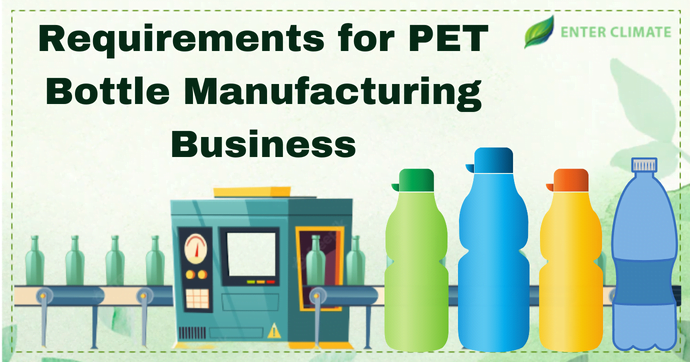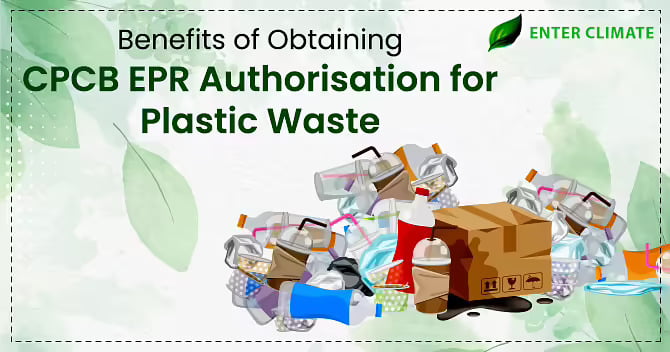Requirements for PET Bottle Manufacturing Business
 27 Sep, 2022
27 Sep, 2022 
Polyethene terephthalate or PET is a kind of polyester or plastic that is used in many manufacturing businesses. PET bottle manufacturing business is one of them. This is because PET has many advantageous properties like non-reactive, lightweight, shatterproof and economical.
In today’s world, the PET bottle manufacturing business is one of the most beneficial and lucrative business opportunities with its low setup cost and a large number of bulk consumers/end users.
Uses of PET bottles in various sectors
Below are some of the various sectors with % usage of PET bottles, along with their timelines.
- Carbonated/aerated drinks comprising 25% PET bottles valid for three months
- Liquor comprising of 12% PET bottles valid for less than two years
- Wellness/pharma comprising of 9% PET bottles valid for 18 months
- Personal care comprising of 8% PET bottles valid for 18 months
- Packaged drinking/mineral water comprising 7% PET bottles valid 12 months
- Edible oil comprising 6% PET bottles valid for 12 months
- Fruit/Nectar drinks comprising 5% PET bottles valid for four months
- Homecare comprising of 5% PET bottles valid for two years
- Dairy, lassi and cold coffee comprising of 1% PET bottles valid for six months
- Agrochemicals comprising 1% PET bottles valid for two years
Market Overview of PET Bottle Manufacturing Business
According to a market analysis report, the international PET Bottle Manufacturing Business was worth 39.7 Billion US Dollars in 2021, which is expected to reach 52 Billion US Dollars in 2027 with the expected Compound Annual Growth Rate (CAGR) of 4.46 per cent during 2022-2027.
Target consumers for PET Bottle Manufacturing Business
One of the most significant aspects of setting up any business is identifying the target consumers that will contribute to the growth of the said business.
For operating PET Bottle Manufacturing Business, the manufacturer must keep the following target consumers in mind –
- Packaged/ water industry: mineral, sparkling
- Drinks industry: liquor, carbonated, dairy
- Edible oils industry: retail oil bottles
- Personal care industry: cosmetics, baby products
- Wellness and the pharmaceutical industry: ointment, syrups
- Agrochemical industry
- Homecare industry
Financial Breakups for PET Bottle Manufacturing Business
Further, while setting up PET Bottle Manufacturing Business, the manufacturers must also consider the financial breakup. This breakup is divided into two types of expenses: Capital Expenses and Operational Expenses.
Capital Expenses
- Expense of land
- Setup cost
- Cost of manufacturing plant
Operational Cost
- Salaries
- Scrap Cost
- Utility expenses such as electricity and water
- Logistics expenses
- Spares and consumables
- Contingency expenses
Machinery and equipment needed for PET Bottle Manufacturing Business
To function correctly and gain profit, PET Bottle Manufacturing Business needs appropriate machinery and equipment, which are as follows: –
- Power Panel
- Blow moulding machine or Injecting moulding machine[1]
- Furniture and fixtures for office
- Printing machine
- Packaging machine
- Electrical installation
- DG set
Raw Materials Required
The raw materials that are required for PET Bottle Manufacturing Business are: –
- PET bottle flake
- PET granules
- PET polymers
- Containers
- Water, power and electricity supply
The manufacturing process of PET bottles
PET Bottles manufacturing involves two stages: Pre-Form manufacturing and Bottle Stretch Blow Moulding.
- The pre-form manufacturing process consists of the following steps:
- Resin drying and dehumidification
- Melting of resin and injection into the mould
- Injection blow moulding
- Primary cooling
- Secondary cooling
- Ejection and storage
- Bottle Stretch Blow Moulding process involves:
- Pre-form feeding
- Pre-form heating
- Transfer of heated pre-forms to blow wheel
- Bottle stretch blow moulding
- Bottle ejection
General Business Setup Licenses
Before fulfilling the environmental compliances, the PET Bottle Manufacturing Business has to acquire mandatory authorisation and licences from the concerned governmental authorities. Some of these licenses are: –
Company license
Documents required for establishing the company
- PAN card
- Address proof such as
- Passport;
- Election card or Voter Identity card;
- Ration card;
- Driving license;
- Electricity bill;
- Telephone bill;
- Aadhaar card.
- Residential proof such as
- Bank statement
- Electricity bill
- Telephone bill
- Mobile bill
- GST registration certificate
- MOA (Memorandum of Association)
- AOA (Article of Association)
Udyam MSME (Micro, Small and Medium Enterprise) Registration
For attaining Micro, Small and Medium Enterprise (MSME) registration, the owner of PET Bottle Manufacturing Business has to apply through the online portal of the authority. Subsequently, the owner must upload the mandated documents. This registration is granted and mandated by the Ministry of Micro, Small and Medium Enterprise.
Documents needed for MSME registration
- Applicant’sofficial name
- Name and type of enterprise
- Aadhaar card
- PAN
- NIC Code
- Account details
- The social category of the applicant
- The business operations of the enterprise
- Date of Incorporation of a business
- Details related to employment
Fire NOC
The fire No objection Certificate (NOC) is mandatory for PET Bottle Manufacturing Business. The NOC is granted by local municipality authorities and regulated by the state government. This involves applying with the mandated documents, which will be forwarded to the Chief Officer of the Fire Service Department, who further inspects the manufacturing site. After the inspection, the report is framed and submitted to the department, granting a NOC for further examination.
Documents required for fire NOC for PET Bottle Manufacturing Business
- Site plan
- Basement floor plan
- Stilt/Ground floor plan
- Floor-wise plan
- Terrace plan
- Section plan
- Elevation plan
- Any other supporting records related to the above documents (if any)
BIS Certificate
Bureau of Indian Standards (BIS) Certificate is required to ensure that the products, which in this case are PET bottles, do not negatively impact public health. As per the BIS, the owner of PET Bottle Manufacturing Business has to fill out the application along with the mandated documents. Subsequently, the owner has to send the test reports of the PET Bottle samples tested at the BIS recognised laboratories. The report of this will be analysed and scrutinised by the authorised personnel. Once the report is reviewed, the BIS certificate is granted.
Documents required for BIS Certificate needed forPET Bottle Manufacturing Business
- A detailed layout/site plan
- Name of raw materials used during the production of PET Bottle Manufacturing Business
- Description of the industrial procedure
- Information on the types of machinery being operated
- The layout of the plant
- Photographs of the PET bottles
- A duly signed undertaking
- Identification proof like PAN card or Aadhaar card
- The test reports of the bottle sample sent by the owner of PET Bottle Manufacturing Business that is to be issued strictly through a BIS recognised lab
- Factory registration documents
- The authorisation form which is correctly filled and signed by the official personnel
GST Certificate
Document required for GST Certificate for establishing PET Bottle Manufacturing Business
- PAN Card
- Incorporation Certificate for PET Bottle Manufacturing Business authorised by the Ministry of Corporate Affairs
- MOA
- AOA
- Aadhaar card of the applicant
- Address proof
- Bank details
Trade license needed by PET Bottle Manufacturing Business
The Municipal Corporation grants a trade license. The licence grant depends on the rules and regulations set by the state. The following documents are needed for Trade licenses. These are to be submitted along with the application.
Documents required for trade license for PET Bottle Manufacturing Business
- Address proof (electricity bill or water bill)
- Memorandum of Association (MOA)
- Aadhaar card
- PAN
- Certification of incorporating (CIN) in case of PET Bottle Manufacturing Business
- A latest municipal property tax receipt in case the land of PET Bottle Manufacturing Business is owned, else lease document or consent letter of the owner of the property where the business is registered.
- NOC of the neighbours (nearby property owners)
- Layout plan/site plan of the office
Environmental compliances for PET Bottle Manufacturing Business
Along with acquiring the general licenses and authorisation, PET Bottle Manufacturing businesses also have to adhere to Environmental compliances governed by the Ministry of Environment, Forest and Climate Change (MoEF).
EPR Authorisation needed for PET Bottle Manufacturing Business
EPR Authorisation for PET Bottle Manufacturing Business is governed under Plastic Waste Management Rules, 2016. The owner must apply under Form I from the State Pollution Control Board (SPCB) online portal, along with the mandated documents. Once the application is submitted, it is reviewed and scrutinised by authorities, following which the owner gets the authorisation.
Documents required for obtaining EPR Authorisation
- PAN card or Aadhaar card of the owner of PET Bottle Manufacturing Business
- Flow diagram of the manufacturing procedure
- Consent certificates issued by the concerned Pollution Control Committee (PCC)/SPCB under the Air and Water Acts
- Authorisation under Hazardous Waste Management Rules granted by concerned PCC/SPCB
- Geo-tagged photos of raw material production, storage and product dispatch areas
- Copy of documents mentioning occupational safety and health aspects
- Geo-tagged photos of plant equipment
- Copy of electricity bill
- Copy of examination report of classification of waste generated
- Details of pollution control measures
- Copy of disaster management plant onsite/offsite
- Document concerning any other info which the unit needs to provide
The authorisation/certification from the respective/applicable state authority for the Operating Plastic Processing unit as given below:
- TIN details;
- PAN details;
- Incorporation certificate.
Consent Certificates for PET Bottle Manufacturing Business
CTE (Consent to Establish) is acquired by the owner of the PET Bottle Manufacturing Business before the unit is established under the Air and Water (Prevention and Control of Pollution) Acts.
CTO (Consent to Operate) is acquired by the owner after the manufacturing business is established and is ready to start the process under the Air and Water (P&CP) Acts.
The certification process for both the Consent Certificates is identical, where the authorisation form is submitted via the online portal of the concerned UT PCC/the SPCB. The required documents accompany this application. This is then followed by reviewing the application. Once the documents are analysed, in the case of the CTO, a government official of state authorities conducts a site inspection and makes the report accordingly. Upon satisfaction, the consent certificate is granted.
Documents required for consent certificate to set up PET Bottle Manufacturing Business
- SSI certificate
- The layout plan/site plan;
- Industry Department Certificate
- Details on channelisation
- Total constructed area
- Total open land
- The project report
- DG specifications
- Water usage breakdown
- Raw material list with daily MTD/monthly quantity
- Boiler type, fuel used and quantity
- Effluent/Sewage Treatment Plant flow diagram
- Specifics on air pollution control
- Permission from the state’ groundwater authority
- Product/by-product list with daily MTD/monthly quantity
- Factory/Trade License
- Site plan
- Authorisation letter
- PAN card
- Municipality or industry license
- The Aadhaar card
- Registration proof of the unit
- Water bill
Conclusion
According to many market analysis reports, PET Bottle Manufacturing Business is estimated to reach 52 Billion US Dollars in 2027 with the expected Compound Annual Growth Rate (CAGR) of 4.46 per cent during 2022-2027 with the constant increase in the consumer base. But, to establish a successful business, one must get all the authorisation and adhere to all environmental compliances. This must be done especially when consumers and investors are drawn towards the business model, which is more eco-friendly and fulfilling their responsibility towards the environment.













